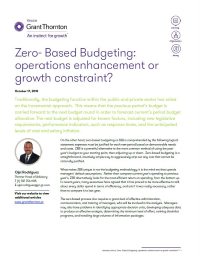Traditionally, the budgeting function within the public and private sector has relied on the incremental approach. This means that the previous period’s budget is carried forward to the next budget round in order to forecast current’s period budget allocation. The next budget is adjusted for known factors, including new legislative requirements, performance indicators, such as response times, and the anticipated levels of cost and salary inflation.
On the other hand, zero-based budgeting or ZBB is comprehended by the following logical statement: expenses must be justified for each new period based on demonstrable needs and costs. ZBB is a powerful alternative to the more common method of using the past year’s budget as your starting point, then adjusting up or down. Zero-based budgeting is a straightforward, intuitively simple way to aggressively strip out any cost that cannot be rationally justified.
What makes ZBB unique is not the budgeting methodology; it is the mind-set that upends managers’ default assumptions. Rather than compare current year’s spending to previous year’s, ZBB alternatively looks for the most efficient return on spending, from the bottom up. In recent years, many executives have agreed that it has proved to be more effective to talk about every dollar spend in terms of efficiency, and ask if it was really necessary, rather than to compare it to last year.
The zero-based process also requires a great deal of effective administration, communication, and training of managers, who will be involved in the analysis. Managers may also have problems in identifying appropriate decision units, developing adequate data to produce an effective analysis, determining the minimum level of effort, ranking dissimilar programs, and handling large volumes of information packages.
Assessing Suitability
Potential benefits
Institutions belonging to, for example, multinational food manufacturing companies, hospitals, and health systems industries are known to apply ZBB due to the following reasons:
- cost reduction while bringing additional value in the form of operational efficiency.
- program prioritization encouragement allow ZBB to increase organizational efficiency by incentivizing stakeholders to work together to analyze operations. In turn, this forces cost centers to identify their mission and priorities, which helps align resource allocations with strategic goals.
- in the case of organizations that are overly complex due to merges or acquisitions, ZBB can be especially useful. Lending global companies are currently implementing ZBB across their entire organization to support aggressive savings strategies.
- for smaller companies and non-profit organizations, adopting ZBB practices on a select function basis is more common and practical because it allows them to target areas of need and invest limited resources towards a specific outcome at custom intervals.
Challenges and risks
ZBB presents an opportunity for organizations to cut costs and improve quantitative and qualitative aspects of operations, but completing a full ZBB cycle can be both, challenging and risky for most organizations mainly due to the following reasons:
- prioritizing program needs can be challenging to some managers and can prove problematic for departments with intangible outputs.
- the process itself is costly, complex, and time consuming.
Applying a “blank sheet of paper” approach to budgeting can derive in certain benefits such as enhancement of the activity-based budgeting, complexity reduction, cost-benefit analyses, and performance budgeting. However, each company should perform their own due diligence to determine if implementing a ZBB approach is viable and goes in accordance with the criteria or functional requirements necessary to optimize effectiveness.


